New U.N. Agency Plans Surprise Inspections in Iraq
- Share via
UNITED NATIONS — The head of the new U.N. commission charged with ridding Iraq of any remaining weapons of mass destruction said Thursday that his agency plans surprise inspections throughout that country as part of its mandate.
In outlining his plan for the commission, executive chairman Hans Blix stressed that the inspection agency will seek to be highly technical, nonpolitical and tightly controlled in its handling of intelligence information.
In what some diplomats viewed as a reference to allegations that the United States had used the agency’s ill-fated predecessor, the U.N. Special Commission, to spy on Iraq, Blix said that “the flow of intelligence must be one way only and have regard only to matters of relevance” to the new group’s task of disarmament.
The 17-page plan, which will be discussed in the Security Council next week, was a significant procedural step in the long and highly contentious process of trying to disarm Iraq.
Weapons inspectors have not been in Iraq since December 1998, shortly before the United States and Britain launched airstrikes to punish Iraqi President Saddam Hussein for failing to cooperate with inspectors in the former agency, known as UNSCOM.
Because of questions about whether the new agency--the U.N. Monitoring, Verification and Inspection Commission--will be able to enter Iraq, Blix said he will fill only key posts on his staff and delay full-scale recruitment until the commission becomes completely operational.
Blix’s plan indicates that his agency will have some important differences from the previous inspection regime.
Unlike UNSCOM, which relied largely on experts recruited from and paid by their own governments, most of the staff will be U.N. employees. Blix will have an executive assistant, and the commission will not have a deputy executive chairman--a post that always has been filled by an American.
In his report to the council, Blix noted that using U.N. employees subject to the international organization’s charter “requires that they shall neither seek nor receive instructions from any government and that member states shall not seek to influence them in the discharge of their responsibilities.”
The citing of such language appeared designed to blunt charges from Baghdad that the new monitoring and disarmament agency is in part a carbon copy of the old team.
Nevertheless, its mandate remains the same, as do many of the operational techniques used to ferret out forbidden chemical and biological weapons and any remaining missile systems.
Blix, the Swedish former head of the International Atomic Energy Agency, reiterated that the central task of the new weapons inspection agency, like UNSCOM, will be “to verify that Iraq complies with the obligations laid upon it by the Security Council.”
The agency will offer its staff special cultural programs designed to underline the importance of understanding national sensitivities and the proper handling of adversarial situations, Blix said.
Since the end of the 1991 Persian Gulf War, U.N. arms inspectors have faced adversarial situations aplenty, with Baghdad constantly seeking to thwart the hunt for any remaining weapons of mass destruction.
Plans call for the new commission to operate a monitoring and verification center in Baghdad, the capital, and regional offices in Iraq if they are required. In addition to conducting surprise inspections, weapons hunters would take samples for analysis, take aerial and ground photographs and operate the agency’s airplanes and helicopters for surveillance throughout Iraq.
If Blix’s team certifies that Iraq is disarming, the U.N. will consider suspending the sweeping economic sanctions that have been in place since Iraq’s 1990 invasion of Kuwait.
More to Read
Sign up for Essential California
The most important California stories and recommendations in your inbox every morning.
You may occasionally receive promotional content from the Los Angeles Times.













